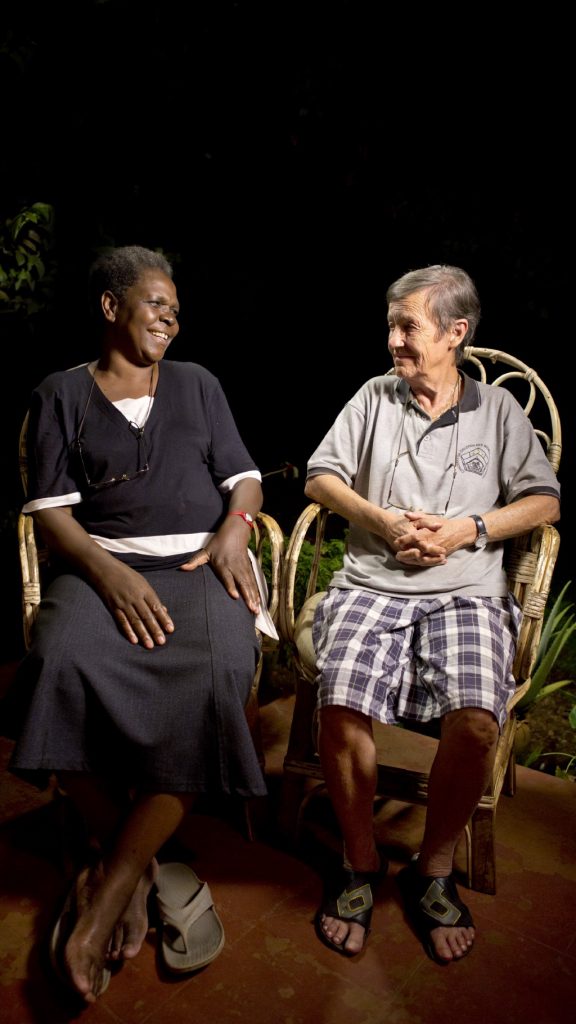“Leaving Africa” is a story of friendship and
strength. Finnish doctor Riitta has been working in Uganda for more
than 25 years. Together with her Ugandan friend Catherine, she brings sex education
to Ugandan villages, challenging priests, imams, women and their husbands to
debate women’s rights to their bodies, sexuality and life. In
ultra-conservative Uganda, this soon leads to serious complications, risking
their entire life’s work.
The
starting point of this film was the urge to find answers to the question “what are the
real benefits of development cooperation, particularly in the fields of gender
equality and education?” My search
led me to the workshop
that Riitta
and Catherine were
doing in Uganda, and soon I was convinced that their gender and sexual health workshop for
religious leaders
from different congregations was something I wanted to explore in depth.
As a
filmmaker, I search for stories where people are forced to re-evaluate their own attitudes and values. I strongly believe that facing our
own pre-assumptions provides tools for the mental and spiritual growth of
humankind.
I went to Uganda four times over a period of one-and-a-half-years. The workshop took place during the first filming session in
December 2011. I was very nervous to meet the religious leaders who attended the workshop, as I felt unsure if they would
trust me enough to let us film their discussion. I knew that if we came across as untrustworthy, our journey would have been a waste of time.
Kata introduced us, and we had a chance to tell them about ourselves, and
they had the opportunity to ask questions about us. I looked all the participants
right in the eyes and tried to explain our project as honestly and as directly as possible.
I could really feel
their suspicion and prejudice towards us. Someone
raised their hand and asked us a question in Ugandan while the rest of the audience looked at us in
silence. Kata, who was translating the questions for us, said that they were
concerned that the film would include pornographic material. Before I could reply, Riitta jumped in with her witty style, saying: “Not at all, not at all,
unless it takes place within these walls.” And then everyone laughed. We were
soon accepted as part of the group. Overall, it felt like people were very open
and willing to share their stories with us — a completely different
experience from what is usually the case in Finland.
At the beginning, I saw Riitta more as a gatekeeper who
would help me get access to film Kata and the workshop attendees.
However, during our second filming session, both Riitta and Kata found themselves in the middle of a turbulent situation, during which they had to battle together as a united front, which revealed the
true power and strength of their friendship in front of my
camera. Riitta and Kata were targets of
homophobic accusations, which caused stressful situations for them for an unbearably long time. So even though the film is about gender equality, sexual health education, emancipation
and the power of openness and transparency, it is also a film about friendship.
A friendship between two independent, strong,
older women whose commitment to their work and
loyalty towards each other is something we rarely see in the media in Western
countries.
When the film was ready, we carefully explored the possibilities of showing it in Uganda. At first, it seemed impossible for political reasons, as it could cause problems for Kata and her organization. However, Kata was able to show it to the right people, which
led to the news that the generals of the Ugandan army
had seen my film and thought that sexual health and gender education is
important. They are now planning to provide
it to all the females in the army and in the police force. As a filmmaker, I could not be more grateful and proud that my
documentary can be a part of these movements and raise awareness and hope for a more equal world.
Iiris Härmä’s third feature-length documentary, “Leaving Africa,” premieres on April 27 in Hot Docs’ International Spectrum section. Härmä has directed and produced four award-winning feature-length documentaries, mostly
about young people searching for their identity and finding their own path in
life, including “The Child of Silent Winter” (2012), “Look at Me” (2010), and “You Live and Burn” (2007).







